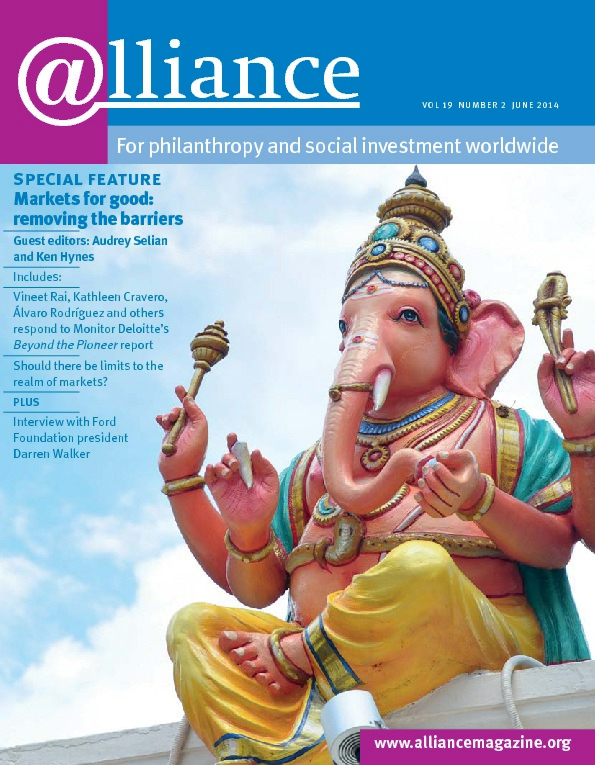Monitor Deloitte’s recent Beyond the Pioneer report highlights some of the critical challenges investees face when delivering on the promise of scale. Placing the firm at the centre of its analysis, Beyond the Pioneer presents a valuable framework for understanding barriers to growth for social sector organizations operating in underdeveloped markets. At LGT Venture Philanthropy, however, we advocate that impact, not organizations, be placed at the centre of the scaling analysis, for three reasons: impact scales are multidimensional; scaling is about achieving mission success; and social capital is essential to scale.
Impact scales are multidimensional, not linear
A broadly peer-reviewed study, the Millennium Ecosystems’ Assessment, identifies five bases of human fulfilment and quality of life: material well-being, social well-being, physical well-being, security and freedom. With few exceptions (eg education), market-based solutions offering single products or services can only help improve a few of these constituents, while underprivileged populations experience deficits in all five areas.
Impact-centred scaling advocates the creation of intertwining models and partnerships that aim to achieve depth of impact. Although this makes scaling more complex, it means that investment can significantly deepen well-being by supporting models that seek to improve several constituents at the same time (for example, through increasing product/service offer, quality, frequency or scope).
An example is Meds & Foods for Kids (MFK), an organization determined to eradicate malnutrition in Haiti. MFK uses Haitian products where possible, which implies an increasingly complex production process, including running a manufacturing company, an agricultural development organization and a charity. MFK has become one of very few organizations in Haiti that contributes to long-term food security and public policy improvement.
Scaling as achieving mission success
As impact-first investors, LGT often declines investment opportunities in social sector organizations that are not highly committed to mission success. At the same time, we have frequently supported impact-centred expansion strategies where the investee is not involved in the direct delivery of products/services, but instead explores other means to pursue their mission such as provision of secondary-level training or technical assistance.
Mothers to Mothers (M2M), whose mission is to eliminate the transmission of HIV from mothers to babies in Africa, is an example of this. After successfully developing and testing their methodology in South Africa, M2M is now empowering seven African governments to improve policy design and roll out their own Prevention of Mother to Child Transmission Programmes. This has involved a switch from direct implementation to a consultancy/advisory role, but has allowed the organization to triple its impact, without an equally large budget increase.
Social capital is essential to scale
Catering for the multiple dimensions of impact calls for effective collaboration among the private, philanthropic and public sectors, which have complementary roles. While such collaboration is happening, it is not happening as often or as productively as it might because of the absence of social capital among the actors. Differing organizational cultures, ignorance of the rapidly changing landscape, and the fact that organizations are simply not designed to collaborate all play their parts in this.
Impact-first investors can help to create trust and promote market-based solutions that connect with, and improve, markets, as well as public policy. We know well that long-term gains can outweigh short-term concessions and understand that building strong ecosystems around solutions requires time and patient capital.
Market-based solutions alone have limited capacity to foster lasting and comprehensive systemic change. Scaling meaningful impact also requires a commitment to placing impact at the centre of the scaling strategy. Impact-first investors can assist this process by: supporting solutions that increase depth of impact, promoting commitment to mission success; implementing integrated impact management systems, fostering trust and collaboration among stakeholders, and supporting organizations that actively attempt to enhance policymaking.
Fabio Segura is chief knowledge officer at LGT Venture Philanthropy. Email fabio.segura@lgtvp.com







Comments (0)